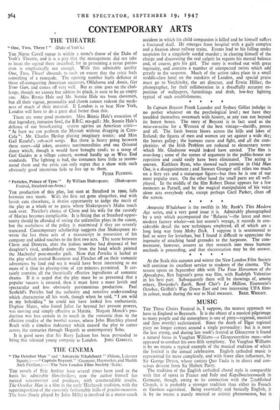THE CINEMA
"The October Man "and Antarctic Whalehunt." (Odeon, Leicester Square.)--" Captain Boycott." (Gaumont, Haymarket, and Marble Arch Pavilion.)—The New London Film Society (Scala).
THE novels of Eric Ambler have several times been used as the basis fo: admirable film-thrillers; now the author himself has turned screenwriter and producer, with commendable results. The October Man is a film in the early 'Hitchcock tradition, with the superimposition of the currently fashionable frills of psycho-neurosis. The hero (finely played by John Mills) is involved in a motor-coach
accident in which his child companion is killed and he himself suffers a fractured skull. He emerges from hospital with a guilt complex and a fixation about railway trains. Events lead to his falling under suspicion for a singularly sordid murder ; in clearing himself of the charge and discovering the real culprit he regains his mental balance and, of course, gets his girl. The story is worked out with great ingenuity, and contains a number of unexpected twists which add greatly to the suspense. Much of the action takes place in a small middle-class hotel on the outskirts of London, and special praise must go to Vetchinsky, the art director, and Erwin Hillier, the photographer, for their collaboration in a dreadfully accurate ex- position of wallpapers, furnishings and drab, low-key lighting typical of such establishments.
In Captain Boycott Frank Launder and Sydney Gilliat indulge in no pother whatever on the psychological level ; nor have they troubled themselves overmuch with history, at any rate not beyond its barest bones. The story of Boycott is in fact used as the mise-en-scene for a Western of the best vintage—sheriffs, posses and all. The fresh breeze blows across the hills and lakes of Ireland; the figures of men and women are set against a wide sky; the horses gallop ; the humans curse and fight, and all the com- plexititez: of the Irish Problem are reduced to elementary terms which Mr. Gladstone would indeed have envied. The film is over-long ; some of the scenes of argument in the public-house are repetitive and could easily have been eliminated. The acting is uneven. Kathleen Ryan, who showed such promise in Odd Man Out, is a disappointment ; and Stewart Granger still relies too much on a fiery eye and a statuesque figure—but then he is one of our most popular stars. On the other 'hand the small parts are all well- played. In the middle of the film Robert Donat appears for a few moments as Parnell, and by the magical manipulation of his voice alone acts everybody else, except perhaps Cecil Parker, clean off the screen.
Antarctic Whalehunt is the twelfth in Mr. Rank's This Modern Age series, and a very good issue it is. Admirably photographed by a unit which accompanied the Balaena '—the latest and most modern factory whaler—on last season's voyage, it records in con- siderable detail the new techniques employed, all of which are a long long way from Moby Dick. I suppose it is sentimental to feel so sorry for leviathan, but I found it difficult to appreciate the ingenuity of attaching hand grenades to the harpoons. The com- mentator, however, assures us that research into more humane methods is proceeding, and that electrocution may be the answer.
At the Scala this autumn and winter the New London Film Society will continue its excellent service to students of the cinema. The season opens on September 28th with The Four Horsemen of the Apocalypse, Rex Ingram's great war film, with Rudolph Valentino in his best part. Subsequently there will be showings of, among others, Dovjenko's Earth, Rene Clair's Le Million, Eisenstein's October, Griffith's Way Down East and two interesting UFA films in colour, made during the war to Nazi measure. BASIL WRIGHT.


































 Previous page
Previous page